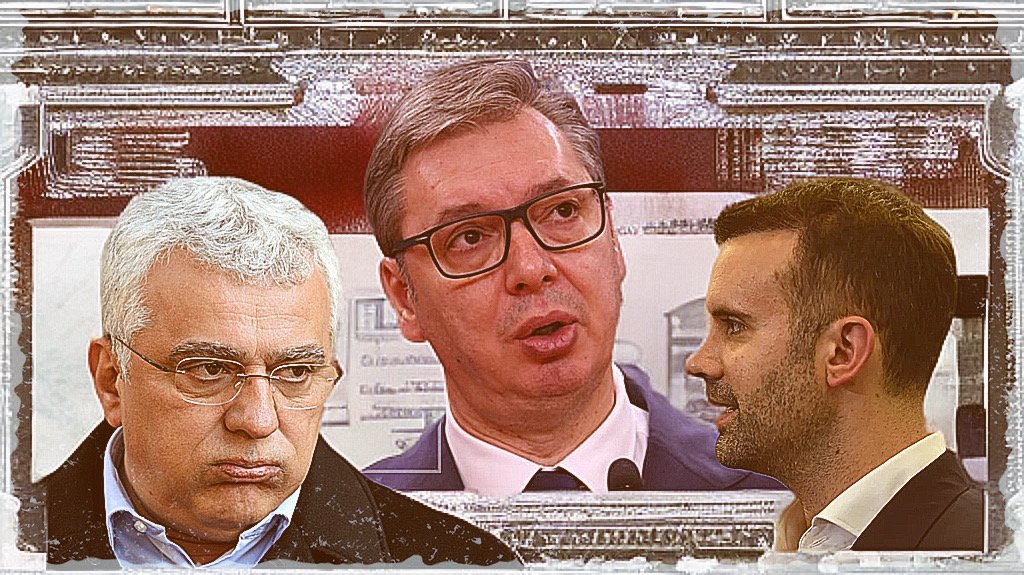Written by Ana Nives Radović
Etymologically, the term proxy comes from the Latin procuratio, meaning action taken on someone else’s behalf. In technology, a proxy acts as an intermediary between a user and the internet, sending requests on behalf of the client while keeping the true source hidden.
In geopolitics, the trick is the same, it’s just that instead of IP packets, politics is transmitted, and instead of bandwidth, it’s sovereignty. Aleksandar Vučić has turned this into what the tech world calls “state of the art”. He has long understood that influence works best when it doesn’t look like influence. He can’t exactly redraw NATO borders, but he can reshape countless other things, making another country act in his interest while believing it’s acting independently.
Montenegro was supposed to be a success story in the Balkans: a multiethnic, reform-minded, civic-minded slice of stability on the Adriatic. Instead, it has become a foreign-policy subcontractor for the most toxic politics in the Balkans in the 21st century, not through invasion or coercion, but through infiltration.
Since the political upheaval of 2020, when factions close to Belgrade helped topple the government, Montenegro has been singing in two voices. One belongs to Milojko Spajić, a pseudo-technocrat telling Brussels exactly what it wants to hear about reforms. The other belongs to Andrija Mandić, Belgrade’s favorite megaphone in Podgorica. Together, they perform a strange duet, where compromises are hidden behind every note, and the only harmony is obedience to Vučić.
These days, the streets of Montenegro echo with choruses of long-repeated verses in which “the Turks are wailing” and “the veiled women are crying”, the multi-part chants of a mob calling for lynching, loud enough from the start for Spajić to interpret as a signal to immediately suspend the visa-free regime for Turkish citizens and overnight turn one NATO member against another.
Officially, the excuse was “security”. But let’s be real, it was imitation. Just days before, Vučić had slammed Turkey for “neo-Ottoman ambitions”, a familiar Balkan dog whistle, and his media machine ran with it, spreading the buzz straight into Montenegro’s already heated regions. When violence flared, Belgrade didn’t bat an eye. It didn’t have to, Montenegro did the heavy lifting. A similar playbook had worked with Croatia.
For years, Podgorica and Zagreb were the odd couple of the Balkans: pragmatic, open, functional. Then, almost out of nowhere, Montenegro’s parliament passed a resolution condemning the Jasenovac crimes, stirring up ghosts that most had tried to bury.
No crisis demanded it. No ally asked for it. Yet Vučić’s Serbia cheered. In Belgrade’s political scripture, every mention of Croatian guilt is a victory, and this time, Podgorica served it on a silver platter. Zagreb hit back, freezing cooperation and slapping persona non grata status on three Montenegrin officials.
Belgrade, meanwhile, stayed unscathed, watching its neighbor’s Western ties unravel from the sidelines. Vučić’s genius isn’t brute force, it’s sly denial. His Serbia doesn’t export war anymore. It exports confusion, flooding neighbors with narratives, nostalgia, and a subtle, persistent call to brotherhood.
The church serves as his intelligence branch, media commentators as field officers, and businessmen as quartermasters, helping him extend what could be called emotional gravity: the closer ideologically Podgorica drifts toward Belgrade’s regime, the harder it becomes to escape its orbit.
Montenegro’s tragedy is that it once resisted this, only to return to it at an even more dangerous moment. Those in power traded autonomy for compliance, some naively believing they could “balance” between Brussels and Belgrade (read: Moscow), between perspective and myth-making. But in the Balkans, neutrality is never neutral, it’s a vacuum someone always fills.
Every Balkan story about a proxy ends the same way: the operator profits, and the proxy burns out. This time, Montenegro’s relations with two NATO members have been damaged, domestic politics paralyzed by identity wars, and ambitions to join the EU held hostage by performative nationalism.
Proxy politics is always a story of self-deception. In IT, the user hides behind a server; in the Balkans, Montenegro claims to act independently, while Vučić’s Serbia claims not to interfere. Both know the truth: Vučić needs neither tanks nor treaties, because he already has what every proxy eventually delivers, control without responsibility.








Tivat
I hope EU representatives in Podgorica will read this and understand the hell in which we live.